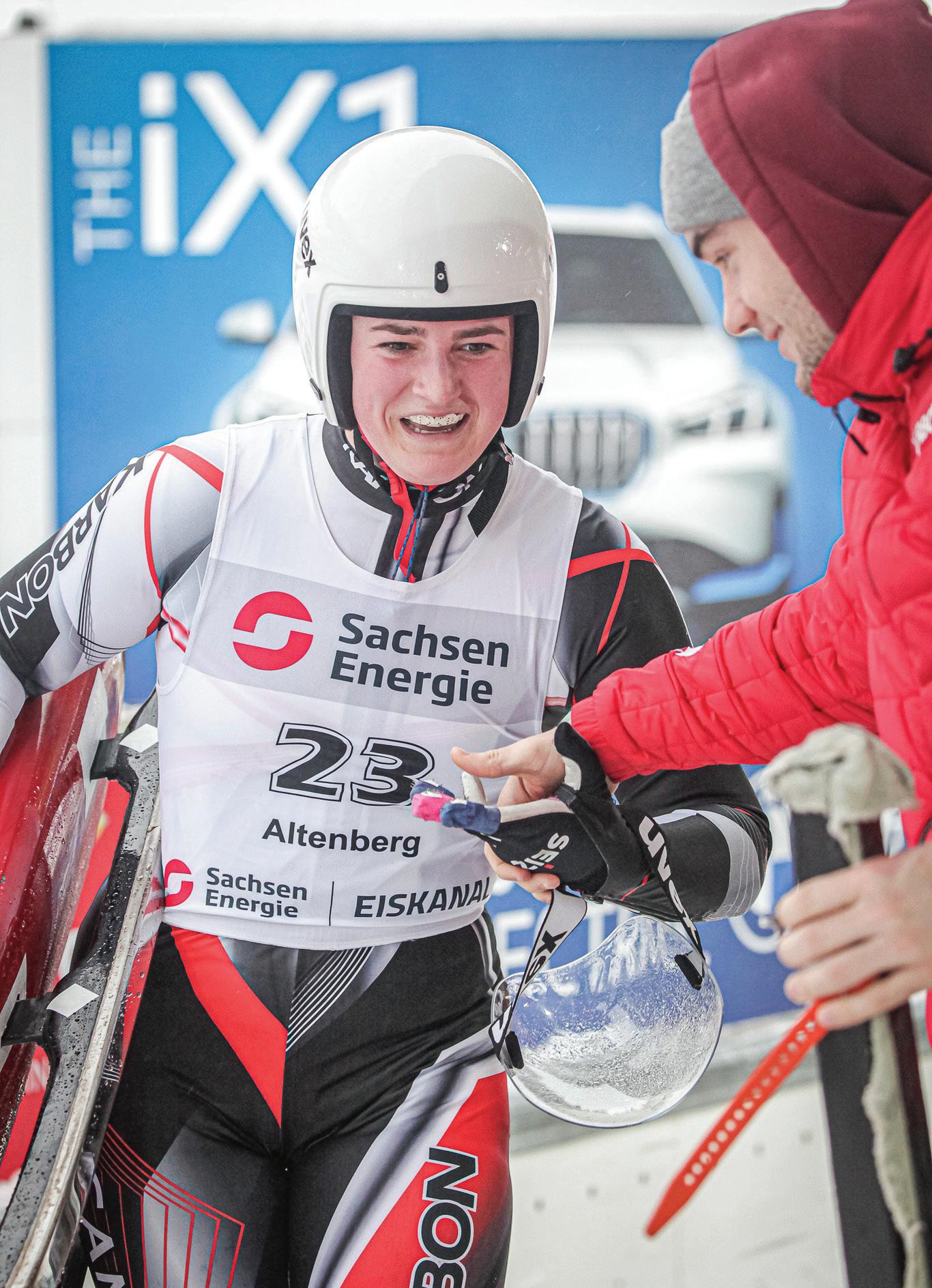
4 minute read
Embyr-Lee Susko places 17th in luge World Cup debut
AT 18 YEARS OLD, THE WHISTLERITE REPRESENTS THE NEXT WAVE OF LOCAL LUGE TALENT
BY DAVID SONG
Advertisement
MANY KIDS GROW UP playing some type of sport: soccer, basketball or hockey, perhaps. Others may pursue rugby or figure skating, and there has always been a robust number of young skiers, snowboarders and mountain bikers in the Sea to Sky.
Embyr-Lee Susko is not like them. One of her first athletic experiences was with luge, during a Cub Scouts field trip at seven years old. The Whistler native was hooked immediately.
“Both of my brothers did luge as well with me,” she explained. “Them being there with me, it was kind of a fun family sport, and I just fell in love with the adrenaline rush that it is going down a giant, frozen water slide.
“That’s what my coaches used to call it, and I still call it that 11 years later. It’s all fun.”
Keep Your Teammates Close
They say that you’ll never work a day in your life if you enjoy your job, and Susko certainly does. She began her journey in the B.C. Luge Development Program hosted at the Whistler
Sliding Centre (WSC). In 2018, she began to distinguish herself with a third-place finish at the Canada Cup and a fourth-place result in that year’s Youth Canadian Championships.
Susko has since won the Youth Canadian Championships twice, in 2019 and on her home track in 2020. At 18 years old, she is part of Canada’s junior national luge team and represents the next wave of developing talent behind veterans like Pembertonian Trinity Ellis or fellow Whistlerites Caitlin Nash and Natalie Corless.
In fact, Susko has brushed shoulders with her older compatriots quite a bit. She travelled to Norway and Latvia for Canadian selection events in 2022, pushing Ellis and company for a spot on the senior national team. Although head injuries kept her out of certain competitions last year, Susko is now well, and showed her potential by placing 17th at her senior World Cup debut in Altenberg, Germany on Feb. 4 and 5.
Her brothers have played a key role in urging her to get faster and stronger.
“[They’ve] definitely made me very competitive, but [they’ve] also taught me to keep my teammates close, even though they’re my biggest competitors,” Susko said. “I’m always using them to push me to go faster, be stronger, and I think my brothers did the same thing, just in a family environment.”
A real sense of sisterhood and brotherhood is found in the sliding community, which might surprise some. Athletes race directly against one another at each competition, and there are only so many places on a podium or a national team. Some might expect this dynamic to foster resentment, but that is not usually the case with luge.
For instance, when Nash and Corless participated in the first World Cup women’s doubles race in Whistler history, their teammates Devin Wardrope and Cole Zajanski cheered them on all the way, with Wardrope calling the achievement “spectacular.”
Similar levels of camaraderie can be found at the junior level. On Jan. 14, Susko won gold in an FIL Continental Cup event at the WSC, edging out runner-up teammate Beattie Podulsky by just over a second. Podulsky stated point-blank that one of her goals is to beat Susko, but made it equally clear that their rivalry is friendly.
“As Canadians on the team, we always want to have a friendly competition with each other and push each other to be better,” Podulsky said as Susko laughed goodnaturedly beside her. “I was really proud of how I came out and how close we were coming down the track.”
SAME, BUT DIFFERENT
Perhaps some of the bonds among lugers form because they relate to each other. Ellis, Nash and Corless all have very similar stories to Susko—they tried luge as children and found a passion for the sport at once. Podulsky is the same: she grew up playing various everyday sports like volleyball, basketball, soccer and swimming, but didn’t love any of them.
Luge was a different story.
“One day I was like, ‘I’m gonna try luge,’” recalled Podulsky, who is from Calgary, Alta. “I had no idea what it was, but seven-year-old me wanted to try luge. I immediately fell in love with it. I love the speed. It’s a lot different from other sports that people are doing.”
Also like Susko, Podulsky is not the only high-performance athlete in her family. Her brother Joshua, a freestyle skier, has influenced her athletic career.
“He’s always telling me about his day and how he wishes to be better,” she said. “I think having [both of us] in a high-performance sport kind of gives us a perspective on different sports. We’re always each other’s biggest supporters as well, because we know what the pressure could be like.”
Every sport involves pressure when you pursue it at a high level, but not every sport involves a margin for error as small as luge. A few thousandths of a second could mean the difference between medal and no medal, tiny movements the difference between a smooth run and a very unpleasant one.
Susko admits to feeling jitters on race day. Keeping herself calm and in a healthy mindset is one of her continuing goals in a sport that is as demanding of one’s mind as it is of one’s body. To do so, she works with a sports psychologist, practicing breathwork and meditation to start most mornings.
She also repeats a mantra given to her by her psychologist, which is adapted from a poem by American author Marianne Williamson.
“My deepest fear is not that I’m inadequate,” Susko tells herself. “My deepest fear is that I’m powerful beyond measure.” n










